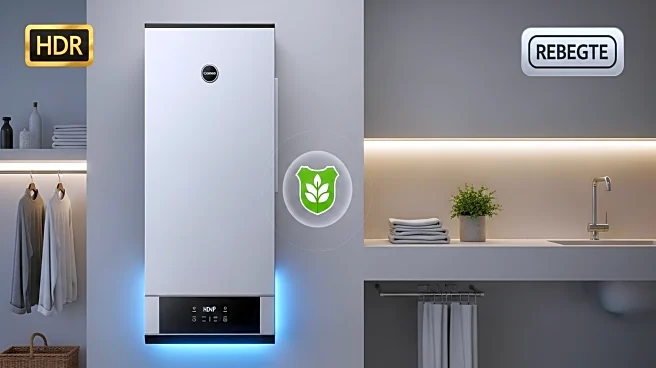What's Happening?
Various regions across the United States are offering significant rebates for Heat Pump Water Heaters (HPWHs) to encourage adoption and reduce upfront costs. These incentives are crucial as HPWHs can save households up to $500 annually compared to traditional electric water heaters. The Tennessee Valley Authority offers a top rebate of $1,300, while other notable programs include Georgia Power's $1,000 rebate and Ameren's $800-$1,150 rebate in the Midwest. With the federal tax credit for HPWHs expiring soon, these rebates provide timely financial support for consumers looking to upgrade their water heating systems.
Why It's Important?
The availability of rebates for HPWHs is significant as it addresses the financial barriers that often prevent households from adopting energy-efficient technologies. By reducing the initial cost, these incentives make it feasible for more families to install HPWHs, thereby unlocking their potential for energy savings and environmental benefits. The widespread adoption of HPWHs can contribute to national energy efficiency goals and reduce carbon emissions, aligning with broader climate action initiatives. Additionally, these rebates support local economies by stimulating demand for energy-efficient products and services.
What's Next?
As the federal tax credit for HPWHs is set to expire at the end of the year, consumers are encouraged to take advantage of the available rebates to lower their upfront costs. Energy providers and policymakers may continue to explore additional incentives and programs to promote the adoption of HPWHs and other energy-efficient technologies. The success of these initiatives could lead to further investments in sustainable energy solutions and infrastructure improvements, supporting long-term environmental and economic goals.
Beyond the Headlines
The focus on HPWH rebates highlights the role of financial incentives in driving consumer behavior and advancing energy efficiency. These programs also reflect broader trends in the energy sector, where collaboration between government agencies, utilities, and consumers is essential for achieving sustainable outcomes. The emphasis on affordability and accessibility underscores the importance of equity in the energy transition, ensuring that all households can benefit from cleaner and more efficient technologies.









